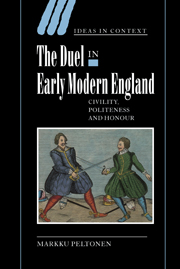Book contents
- Frontmatter
- Contents
- Acknowledgements
- Introduction
- 1 The rise of civil courtesy and the duelling theory in Elizabethan and early Stuart England
- 2 The Jacobean anti-duelling campaign
- 3 Duelling, civility and honour in Restoration and Augustan England
- 4 Anti-duelling campaigns 1660–1720
- 5 Politeness, duelling and honour in Bernard Mandeville
- Epilogue
- Bibliography
- Index
- IDEAS IN CONTEXT
Introduction
Published online by Cambridge University Press: 22 September 2009
- Frontmatter
- Contents
- Acknowledgements
- Introduction
- 1 The rise of civil courtesy and the duelling theory in Elizabethan and early Stuart England
- 2 The Jacobean anti-duelling campaign
- 3 Duelling, civility and honour in Restoration and Augustan England
- 4 Anti-duelling campaigns 1660–1720
- 5 Politeness, duelling and honour in Bernard Mandeville
- Epilogue
- Bibliography
- Index
- IDEAS IN CONTEXT
Summary
Richard Hey, a fellow of Magdalene College, Cambridge, wrote in 1784:
Perhaps, however, it will even be urged, that some private Vices are directly beneficial to the Public; that the Vice of Luxury, for instance, promotes every useful Art and a general Civilization of Manners. But, whatever Good may in fact arise from any Vice, it is enough to see that the same Good might be produced by other means, if all Vice were taken out of the World.
A highly important issue was clearly at stake. Hey firmly maintained that vices must never be accepted even if they happened to promote a ‘useful Art and a general Civilization of Manners’ simply because these same benefits could always be produced by better means. In particular, Hey was convinced that a ‘Refinement of Manners … as an external ornament … will spring up as the genuine fruit of the Heart’ – that there was a close link between outward civility and the inner self. The crucial question was not, however, whether luxury was beneficial or detrimental to ‘a general Civilization of Manners’. Luxury was merely Hey's illustrative example. The real issue at stake was duelling: ‘Arguments therefore in favour of Duelling must be intirely nugatory, even if they can prove that it counteracts the operations of other Vices, or is directly productive of some good Effects.’
As Hey's ruminations suggest, duelling was closely entangled with the larger debate about civility and politeness in early modern England.
- Type
- Chapter
- Information
- The Duel in Early Modern EnglandCivility, Politeness and Honour, pp. 1 - 16Publisher: Cambridge University PressPrint publication year: 2003

